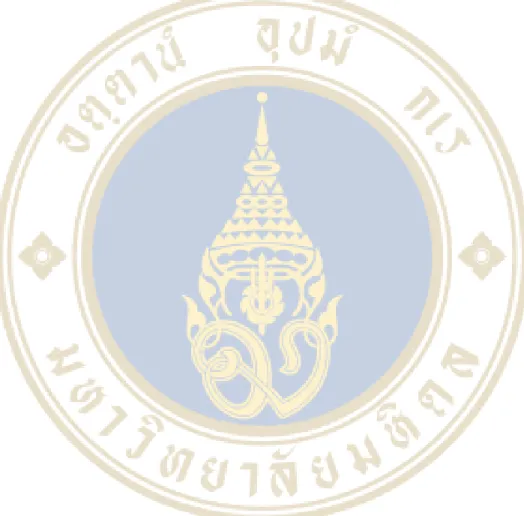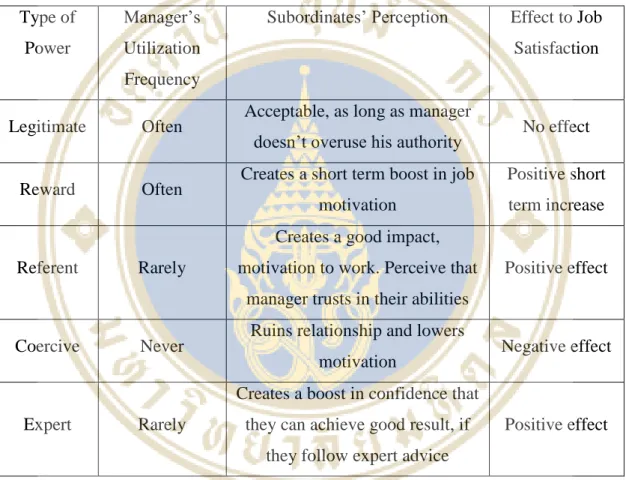The case was analyzed by adopting French and Raven's power framework in relation to job satisfaction. What is the level of subordinates' job satisfaction and perception of the use of power by their junior boss. To see which is the most and least preferred type of power to use with these subordinates to increase job satisfaction.
Auto Gallery Seacon co., ltd., one of the leading Ford dealers in Thailand, is selected as a case study to study the level of job satisfaction of subordinates against the use of power from their boss. The study by Koslowsky, Stashevsky and Ashuri (2001) measured the relationship between job satisfaction and power use. Using different types of power to guide subordinates will also have a direct impact on job satisfaction.
Many studies have been conducted to find out the relationship between employee job satisfaction and the manager's power base. In Skinner, Dubinsky, and Donnelly's (1984) research, they also attempt to measure the job satisfaction of retail salespeople.

Framework of This Research
In various studies cited in the research of Skinner, Dubinsky and Donnelly (1984), they conclude that non-coercive powers; reward, legitimate, expert and referent, are positively related to job satisfaction. Based on this point, we can conclude that non-coercive powers should work well in different industries to achieve overall job satisfaction.
CONTEXTUAL BACKGROUND
From this study, we will be able to find out the level of job satisfaction that relates to the different types of powers used. We will also find out what power is most applicable in this company's environment that will drive and increase the level of job satisfaction in this organization.
DATA COLLECTION METHODOLOGY
If you have to ask your subordinates to do a task that no one likes to do, what power will you use and why. What power do you often use to get your subordinates to work for you? What power would you like to use to get your subordinates to work for you.
If you overuse one type of power, do you think it will have a long-term, short-term, or no effect on job satisfaction? Before interviewing them, I gave them a list of types of power, definitions, and examples to make sure they understand the meaning of each type of power. What is the type of power your boss always uses to ask you to do the task?
What power should your boss use to get you to do the work for him. What power will guide you to do your best and feel satisfied with your work. Type of power you prefer to receive from highest to lowest and explain in detail.
How satisfied are you with your boss's use of power? Does your boss always use one type of power, or does it mean he's asking you to do your job, e.g. Are you happy working under a junior boss and the way he asks or forces you to work for him?
What kind of order would make you feel comfortable working for your boss and why.
RESEARCH FINDINGS AND DISCUSSION
The Use of Power and Impact on Job Satisfaction
As one technician explained, "If I've caused or made a mistake, I can accept being yelled at or accepting a threatening order from my manager." However, the manager can only use this type of power when his subordinates make a mistake and have to redo the entire task. If this case happens, the young manager can use this type of power and force his subordinates to do the work immediately. In this context, job satisfaction will not be achieved according to most technicians' opinions.
But the types of power that the manager prefers to use with his subordinates are reference and reward powers to get his subordinates to work for him with and without his supervision because he believes it will increase overall job satisfaction and improve his relationship to subordinates. : “If I can choose, I prefer my technicians to work for me, because they really want to do it for me. It seems that he tries to give rewards, both monetary and non-monetary, when his subordinates do a good job or are able to achieve a good result. In his opinion, reward power will be the best option because it will make his subordinates feel satisfied and genuinely want to get things done for him: "By giving some money to technicians after they have achieved good results, they will increase their motivation to do their work and increase job satisfaction, but the feeling will not last as long.
Unless the reward is something they value, it will have a big impact on job satisfaction and motivation.” In his opinion, rewards temporarily increase short-term job satisfaction. Besides that, he also tries to buy them snacks and drinks once a month, which he hopes will increase the bond between him and his subordinates. If they like someone to their heart's content, they will do any kind of job that person asks for without any questions." For expert and referent power, the manager believes that it will increase both short- and long-term job satisfaction because the older subordinates can consult with their manager how to achieve a good result and it also shows that their manager knows exactly what they are doing.
They see that their manager is thinking and caring about them because he is trying to give them a plan to work and follow. This will make subordinates think that they can get a good result by following the manager's order. Doing what Lo and Ramayah suggest will increase both performance and job satisfaction in this case.
On the other hand, many researchers suggest that coercion will have a negative correlation with job satisfaction.
Perception of Powers from Subordinates and Job Satisfaction
In addition to reward power, the young manager also tries to use expert power and referral power: "These technicians want to work for someone who can give them advice or solve a problem for them. This is completely contrary to Skinner, Dubinsky and Donnelly's (1984) findings that a leader with strong legitimate power will have employees with high job satisfaction in the retail business. In this company, technicians will do their job as long as that's what they have to do, fix the car, even without reward attached.
According to them, the reward is a short-term motivation, and the manager can use it as a means of temporarily increasing job satisfaction: “We still have to fix the cars. If any technician succeeds in reaching the target, they will earn 4% on top of their salary. By interviewing technicians at this car company, we found that they rank reference power as the power they want their junior manager to use: “If I can choose, I prefer to work for my manager because I like working for him.
Even if he assigns me something unrelated to my current job, I'll be happy to do it for him.” They will be happy and content to work for someone who understands and empathizes with them. Techies here believe that by following someone who is an expert in the field, their manager can help them improve their performance or guide them through difficulties. They think that they will have a better working environment and they will feel very satisfied to work here as well.
Because he just joined and worked in this business for 2 years and it may take around 5 – 6 years to learn and be an expert in this field. Somsak, who had been in this field for at least 15 years, any technician could consult him about car repair and he was able to give the right answer every time. In this company, although legitimate power may not have that much effect on job satisfaction according to what technicians perceive, but the other 3 non-coercive powers seem to have a positive effect on job satisfaction.
They all agree that combining two types of power at the same time will increase job satisfaction.

LIMITATIONS AND FURTHER RESEARCH
CONCLUSIONS AND RECOMMENDATIONS
By doing so, it will try to encourage and motivate each technician to repair the car properly and try to repair it within a given time. In order to gain referent power, I would like to suggest this young manager to take the coaching and engaging approach to dealing with his subordinates. Based on this, this young leader must encourage his subordinates to share their opinions instead of telling them what to do.
The more he listens to the opinions of his subordinates to solve problems, the more commitment he will obtain from his subordinates. If a young leader can apply this approach and encourage his subordinates to share their opinions to solve the problem, it is likely to develop a trusting relationship between each other. In addition, this young leader can develop reference power from this process.
In this case, none of the technicians indicate that they want to receive this type of power from their young leader. Threatening and coercing will do no good and will negatively affect job satisfaction. If there is proof of their mistake, they can accept the consequence without holding grudges or negative feelings towards the young leader.
For this context, I would recommend this young manager to try using referent with reward or expert with reward powers. Using these powers will help increase the level of job satisfaction and bond between him and his subordinates. By utilizing two types of power correctly and at the right time, it will create a good impact on job satisfaction and morale as well.
After analyzing, I would like to conclude that this young manager does not seem to possess reference and expert powers at the moment, but rather he regularly exercises legitimate and reward powers.